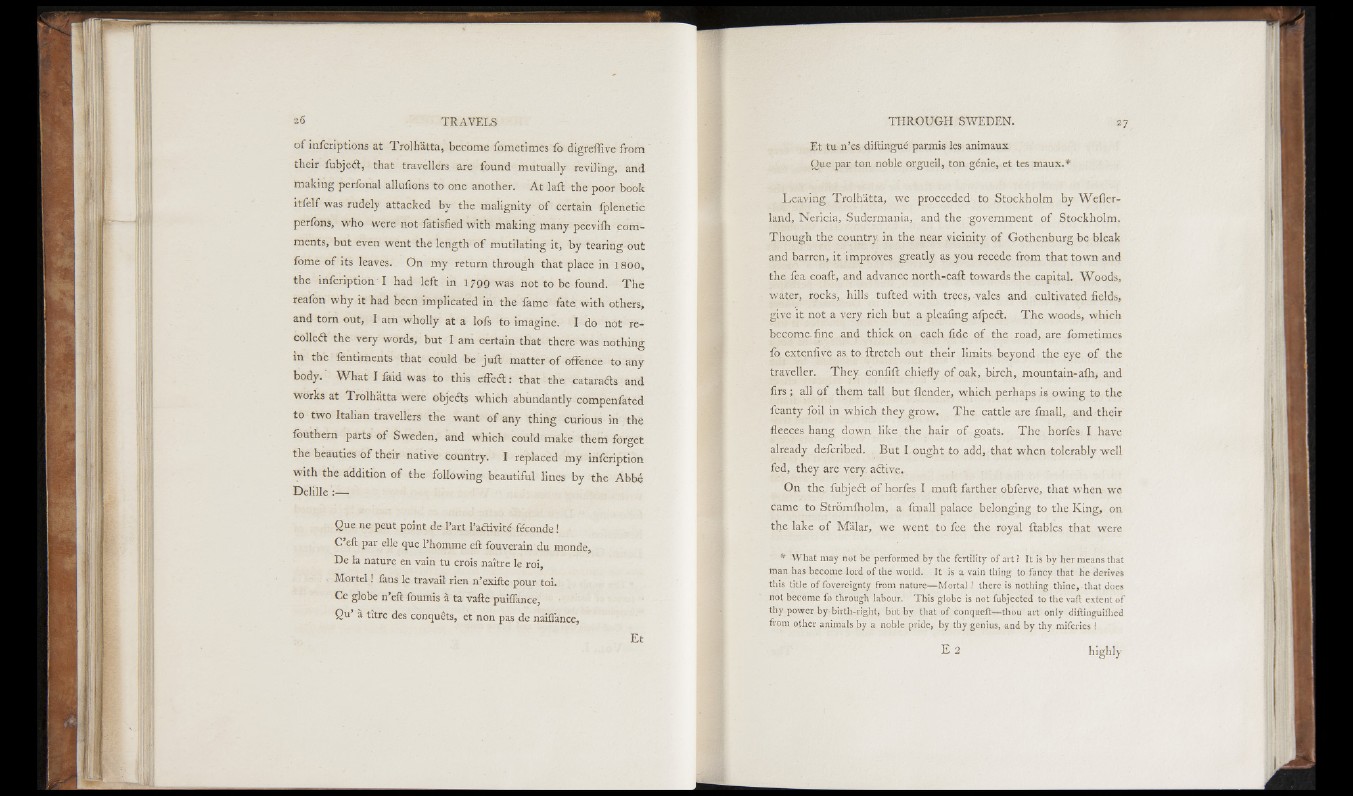
of infcriptions at Trolhatta, become fometimes fo digreffive from
their fubject, that travellers are found mutually reviling, and
making perfonal allufions to one another. A t laft the poor book
itfelf was rudely attacked by the malignity o f certain fplenetic
perfons, who were not fatisfied with making many peevifh comments,
but even went the length o f mutilating it, by tearing out
fome o f its leaves. On my return through that place in 1800,
the infcription-I had left in 1790 was not to be found. T he
reafon why it had been implicated in the fame fate with others,
and torn out, I am wholly at a lois to imagine. I do not recoiled!:
the very words, but I am certain that there was nothing
in the fentiments that could be ju f l matter o f offence to any
body. Wh at I faid was to this effedl : that the catarads and
works at Trolhatta were objeds which abundantly compenfated
to two Italian travellers the want o f any thing curious in the
fbuthern parts o f Sweden, and which could make them forget
the beauties o f their native country. I replaced my infcription
with the addition o f the following beautiful lines by the Abbé
Delille':—
Que ne peut point de l’art l’activité féconde !
C’eft par elle que l’homme efl fouverain du monde,
De la nature en vain tu crois naître le roi,
- Mortel ! fans le travail rien n’extfle pour toi.
Ce globe n’eft fournis à ta vafte puiffance,
Qu’ à tître des conquêts, et non pas de naiffance,
Et
Et tu n’es diftingué parmis les animaux
Que par ton noble orgueil, ton génie, et tes maux.*
Leaving Trolhatta, we proceedetl to Stockholm by Wefler-
land, Nericia, Sudermania, and the -government o f Stockholm.
Though the country in the near vicinity o f Gothenburg be bleak
and barren, it improves greatly as you recede from that town and
the fea coafl, and advance north-eafl towards the capital. Woods,
water, rocks, hills tufted with trees, -vales and cultivated fields,
give it not a very rich but a pleafing aipeél. T h e woods, which
become, fine and thick on each fide o f the road, are fometimes
fo extenfive as. to flretch out their limits beyond the eye o f the
traveller. They, conflit chiefly o f oak, birch, mountain-afh, and
firs ; all o f them tall but flender, which perhaps is owing to the
fcanty foil in which they grow. T he cattle are fmall, and-their
fleeces hang down like the hair o f goats. T he horfes I have
already defcribed. But I ought to add, that when tolerably well
fed, they are very, aétive.
On the fubjeét o f horfes I mull farther obferve, that when we
came to Stromfholm, a fmall palace belonging to the King, on
the lake o f Malar, we went to fee the royal fiables that were
* W h a t may not be performed by the fertility o f art ! It is by her means that
man has become lord of the world. I t is a vain thing to fancy th a t he derives
this title o f fovereignty from nature—Mortal 1 there is nothing thine, th a t does
not become fo through labour. Th is globe is not fubjected to the vaft extent o f
thy power by birth-right, but by th a t o f conqueft—thou a rt only diftinguiflied
from other animals by a noble pride, by thy genius, and by thy miferies !
highly